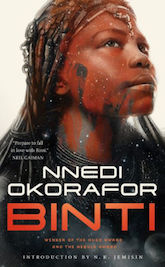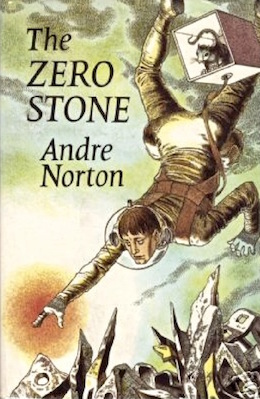I actually remember reading this. I remember the title, the ring it refers to, and the inimitable Eet. I don’t remember anything else, so most of it seemed new, but with a sort of distant echo of, “Wait, I’ve seen this before.”
Some of that has to do with the fact that I’ve been working through the entire Norton canon, and she certainly had her favored tropes and plots. The Zero Stone, though published in 1968, is a throwback to her planetary adventures of the Fifties, with its overwhelmingly male-dominated universe. You’d never know that the Witch World was well under way, or that this same universe could also contain the likes of Maelen of the Thassa and the alien Wyverns (the latter are even mentioned in passing).
The only females we see here are the cold, unloving mother, the nonentity sister, and the cat who serves as an incubator for the alien intelligence.
Incubators, in fact, are a theme here.
Our protagonist, Murdoc Jern, is not the usual orphan loner; he has parents, and a brother and a sister. His father, Hywel, was once a member of the Thieves’ Guild and is now a well-to-do gem merchant. Murdoc does not get along with his mother or his siblings, though he doesn’t learn why until much later.
I mentioned incubators. It turns out that on settled planets, embryos brought in on the original colony ship may be implanted in women of later generations. These women are not apparently given a choice, and the results are called “duty children.” Murdoc is a duty child, which explains both his mother’s coldness and his lack of connection with his siblings.
His father treats him decently, more or less: apprentices him to a spacefaring gem merchant, while taking steps to make sure that the biological son inherits the family business. Hywel appreciates Murdoc’s talents and his own son’s lack thereof; when he is murdered, both sons are as well protected as they can be.
Murdoc inherits one thing from his father, which turns out to be worth more than all the rest put together: a strange alien ring of unknown value. The Thieves’ Guild kills Hywel for it, but Murdoc has already taken and hidden it.
The Guild goes after Murdoc and his employer through the priests of an alien cult. Murdoc barely escapes with his life and a handful of gems—and the ring—and uses some of the gems to book passage off planet on a Free Trader.
Murdoc’s flight is not even slightly comfortable. Free Traders are oppressively clannish and have no use for outsiders. To make matters worse, the trading voyage runs into a snag, and Murdoc inadvertently exposes the ship’s cat to an alien…something. It looks like a collection of fuzzy rocks, one of which she obsessively licks and eventually swallows.
The rocks are not rocks at all, but seeds of a sort. The cat becomes pregnant with a mutant telepathic alien, which immediately latches on to Murdoc. Then Murdoc comes down with an alien plague.
Again he barely escapes with his life, this time with the alien, Eet, for company—throwing himself into space with nothing but a spacesuit, a pet carrier, and the ring. The ring latches on to an alien lifeboat, which transports Murdoc and Eet to an unknown world full of inimical aliens, ancient ruins, Guild agents mining for whatever is in the ruins, and a Patrol officer who is convinced that Murdoc is in cahoots with the Thieves’ Guild.
The ring, which Hywel used to call the Zero Stone, is the key to it all. It acts as a tractor beam when within reach of ancient alien technology, it can enhance the power of human and alien ships, and it has other, less obvious powers that make it very valuable indeed. The Guild is trying to find the source of this stone and others like it. It believes the world on which Murdoc and Eet land is that source, and in fact there is a cache of stones there—which Murdoc and Eet find and then hide—but the real source is elsewhere. Eet indicates that he knows where.
Murdoc and Eet reach a very prickly detente with the Patrolman, Hory, who turns out to be much higher up in the chain of command than he initially seems to be. They join forces to defeat the Guild, and strike a bargain: enough funds to purchase a ship in which to track down the source of the stones. That bargain includes the ring, very much against Murdoc’s will. But they haven’t really lost anything: they have a stone of their own, liberated from the cache. With that in hand, they take off for uncharted stars.
Murdoc’s universe is rather dark as Norton universes go. The bad guys are just plain bad, there aren’t really any good guys, everyone is out for what he can get, and Murdoc can’t trust anybody. Nobody loves him. Nobody cares about him except the man who turns out not to have been his biological father, and most of that seems to be based on duty and a sense of obligation to the child he and his wife were forced to raise.
The one being who has any real use for Murdoc is Eet—and there’s nothing soft or affectionate about it. Eet is a very old alien intelligence who encysted himself in the fuzzy black rock and bided his time until a suitable host should find the rock and swallow it. We never learn what his original form was or where he comes from, though it’s clear he has something to do with the confederation of beings who mined or manufactured the Zero Stone. In this life he appears to be a kind of cat-ferret-rat-monkey creature with strong telepathic powers and no compunction about treating Murdoc like a combination sidekick and beast of burden.
Eet has attitude to burn. He’s far smarter than his human minion, and he knows it. He’s rude; he’s arrogant. He knows everything. He never apologizes, and he seldom compromises.
Buy the Book


Binti
Murdoc submits to a whole lot of being pulled hither and yon, often literally in the case of the ring and the spaceships on which he finds himself, but he doesn’t submit quietly. He takes initiative in taking the ring from his father’s vault, in booking passage on the Free Trader, in surviving complicated and frequently dangerous adventures both alone and with Eet. He doesn’t submit tamely to Eet’s demands, either. He speaks up for himself as often and as firmly as he can. But Eet remains in charge of their odd and reluctant partnership.
There’s a distinct irony here, and it’s clearly intentional. The human is the subordinate; the animal companion calls the shots, though the human gets some say in what’s decided. What looks from the outside like a man and his pet is in fact the reverse. They work together for mutual benefit, take advantage of each other’s skills and talents, and head off at the end in search of new adventures.
I’m looking forward to the next installment, Uncharted Stars. As odd and uncomfortable as their interactions are, Murdoc and Eet are an interesting pair. I hope we’ll learn more about who Eet is and where he comes from. And I hope the universe treats Murdoc a little more gently, and lets him find a little more happiness in life than he’s managed so far.
Judith Tarr’s first novel, The Isle of Glass, appeared in 1985. Her most recent novel, Dragons in the Earth, a contemporary fantasy set in Arizona, was published by Book View Cafe. In between, she’s written historicals and historical fantasies and epic fantasies and space operas, some of which have been published as ebooks from Book View Café. She has won the Crawford Award, and been a finalist for the World Fantasy Award and the Locus Award. She lives in Arizona with an assortment of cats, a blue-eyed dog, and a herd of Lipizzan horses.










